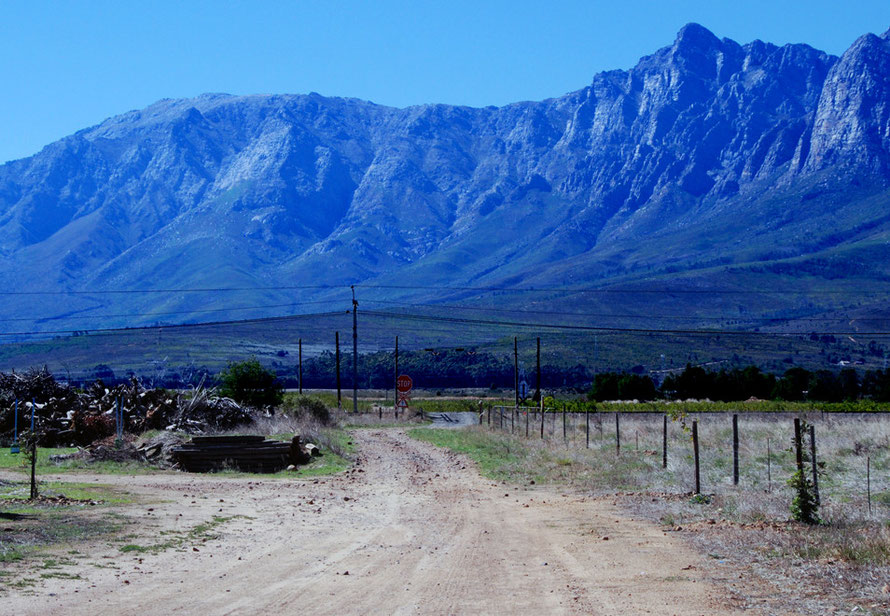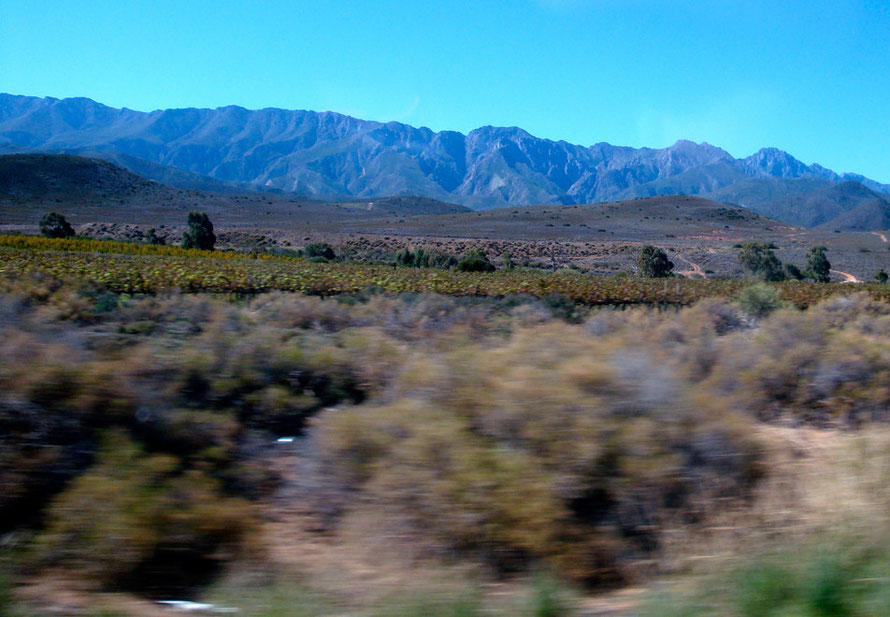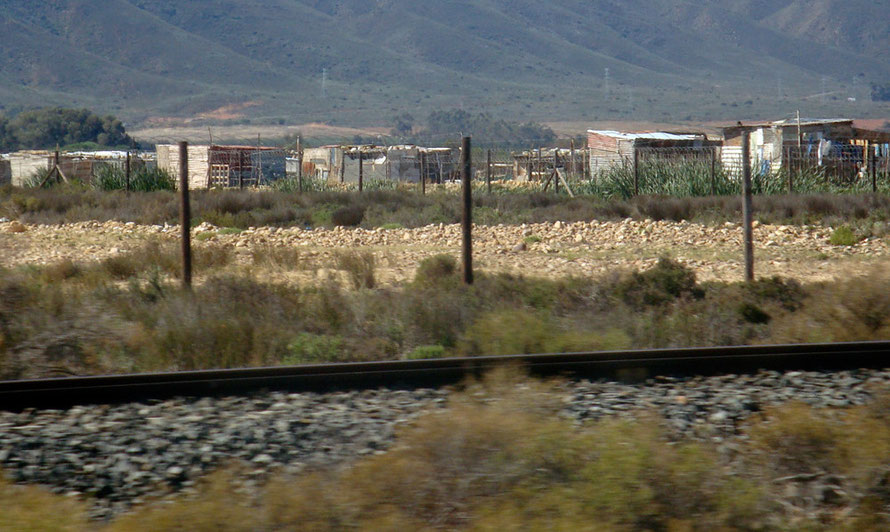Wineland V: Fair Trade and the Western Cape Wine and Fruit Industry
Unfortunately the report Human Rights Watch report (see previous page) did not name and shame individual producers due to a fear of reprisals against their workers. Nor did it make clear if fruit growers were worse or better than wine growers.
The Fairtrade Label South Africa organisation acknowledged widespread problems on South African farms but also made this comment:
The limitation of the Human Rights Watch report is that it is about stories from 60 different farms. The report is a compilation of instances of abuse on all these workplaces but presented as if these problems are the norm on most farms. Although the stories are terrible the report can be misleading.
Noting the report on her website Jancis Robinson, the FT's wine writer, wrote,
'There are various well-meant official initiatives in the Cape wine industry that can be quoted, but few signs of a real desire to clean things up once and for ever.'
She suggested a policy of vineyard inspections and certification for wine exporters, who are under pressure from buyers, particularly the Swedish alcohol monopoly, Systembolaget which buys considerable quantities of South African wine. American buyers are particularly sensitive to charges of unfair working practices although questions remain about the conditions of Mexican workers on which the Californian wine business is 'absolutely dependent'.
There are also a number of fair trade initiatives in the Western Cape but coverage is patchy and even a blanket export certification scheme would leave producers for the domestic market unregulated and would do nothing for the fruit industry, nor for those Black and Coloured people who live in the winelands but struggle to find work at all.

The not-for-profit Wine and Agricultural Industry Ethical Trade Association (WIETA) announced in May 2012 that it was setting up a new fair labour accreditation scheme and label.
Jancis Robinson reported positively on this saying
The fair labour initiative is supported not just by foreign retailers but also by all the key players in South African wine: the Food & Allied Workers' Union (FAWU), Sikhula Sonke, Women on Farms, SA Liquor Brandowners' Association (SALBA), Wine Cellars SA and the producer organisation VinPro.
WIETA will be working with Wines of South Africa (WOSA), who will promote the new ethical seal, along with Fairtrade and Fair for Life, to trade and consumers.
Robinson criticised potential loopholes whereby wine blenders would not have to ensure compliance with all their suppliers and policing compliance will be a major job for WIETA.
From the WIETA factsheet on the wine value chain ethical trading initiative:
There are just over 3 500 primary producers, and 43% of these are small, mixed farms which supply less than 100 tons of wine grapes annually. A total of 573 cellars crush grapes. This translates into a huge challenge. Some of the big producers, however, have been working with their producers for a while to ensure that they can be accredited, and have indicated that they will be writing into their 2013 or 2014 contracts that all farms supplying them must be WIETA accredited. WIETA is gearing up with trainers and auditors to meet this challenge, and it is envisaged that by the end of 2014, 60% of South Africa’s winegrowers will be accredited.
Currently, 79 cellars and farms are WIETA accredited.
Tim James, a South African wine writer, reported in May 2012 that Franschhoek Wine Valley Board and its Vignerons Owners Forum, decided that full WIETA accreditation and certification will become a requirement for membership.
It appears that WIETA aims to police its ethical code through a process of 'participatory social auditing' - see the video on WIETA website. This is a laudable aim as it works with farmworkers and dwellers to develop their capacity to monitor and report on their conditions but it is hugely resource intensive, certainly in its initial stages.
A report of the initiative on the South African Wine website attracted two comments. Peggsue Lawson said, 'Wieta has forgotten its founding principles and traded in political will for being a pawn for producers. '
With the best will in the world, Surely Wieta cannot be that flush with cash or well financed that they have a credible budget to launch their own unique PR and an International awareness campaign for this "new" concept.
You do wonder? Interestingly the author (see below) of the report of Ripe for Change (see above) does give the WIETA initiative qualified support, particularly if it witholds certification from farms or supply chains that do not pay a living, as opposed to a minimum, wage.
South African wine producers were quick to protest the Human Rights Watch report criticising its small sample size and the lack of differentiation of conditions in fruit as opposed to wine producers - see Decanter for example.
A report on the Mother Jones website (7 September 2011) in the US got a response from the lead author of the report, human rights lawyer and writer Kaitlin Y. Cordes, which seemed to support the wine growers' criticisms. She said in her response,
'I also want to clarify that the HRW report documented abuses against workers in both the fruit and wine industries, and that the majority of the farms covered in the research were actually fruit farms.'
I think this does raise legitimate questions about sample sizes and the balance of the report's findings between the wine and fruit industries in the Western Cape. It should have been more transparent on this aspect and it certainly weakens the report's findings, which by its presentation and photographs seems to be more about the wine industry than the fruit industry.
Kaitlin Y. Cordes wrote on her website Righting Food on May 14th 2012 that, 'I had conducted approximately two-thirds of my interviews on fruit farms, something made clear in the report.' Although she felt the need to clarify this in the Mother Jones report above.
I went back and looked at the HRW report and this is what it said on p.25,
This report covered over 60 farms, 21 of which were visited by Human Rights Watch researchers. [...] Most of the farms produce fruit; approximately one-third are wine farms or wine and fruit farms, while a few produced vegetables or flowers.
This is anything but clear. For a start only a third (21) of the total farms (60) were visited for interview. So of that third (21 farms) is the two-thirds of the interviews Cordes conducted 'on fruit farms' two-thirds of 21 - ie 14?
But more importantly the wording in the HRW report is not clear. For a start it should have defined a 'fruit farm' - which it does not. From what I have read many farms in the Western Cape produce grapes for the table - ie fruit not wine. The only indication of a definition of a 'fruit farm' in the report is the graphic representation of fruit farms with a citrus fruit symbol on the map of the Western Cape. So there is a real problem here about the simple definition of 'fruit' and 'fruit farms' in the report.
Putting that aside what the report should have made clear is that of the 60 farms surveyed 40 were fruit farms and 20 were either wine farms or fruit and wine farms. Even this latter point should have been clairified saying which farms were exclusively wine producing and which were mixed fruit and wine producing. The report should have made clear that its main findings were biased towards - at least by sample size - fruit farms. But it deliberately/misguidedly fudged the issue.
This should have also been made clear in the press release that The Guardian (see previous page) reproduced pretty much word for word and headlined, 'South African Wine Industry rooted in human misery, says report'. Surely the Guardian headline should have read '20 farm survey claims human rights abuses exist in South African wine industry.'
More damning than this is that the report has a photo of a wine farmworker (or at lest I assume the grapes are for wine and not the table) on the front and most photos within it are of wine farms (or are the grapes destined for the table?) - there is only one of an unambiguous 'fruit' farm - an orange farm at Citrusdale.
This is exacerbated in the 8 minute 'tabloid' video made of the report hosted on The Atlantic Philanthropies website. This is a lovely little video with exceptionally high production values for a web-based video but it gives the impression that all the woe it reports comes from the grape farms that are used to make wine (cut to a bloke pouring out wine for tasting) and that it is the government that is failing its people by not enforcing labour standards, stopping evictions and providing proper housing in Stofland township. No wonder the Western Cape government was 'livid' (see below).
Of course it is easier to point the finger in the report at the well known and easily identifiable wine trade than the more amorphous - partly because undefined in the report - fruit industry. And the wine industry got pretty het up about the report. And the report's author then congratualed herself on her website on the upset she had caused. She said,
'Last August, many people in the South African wine industry, the South African farmers’ associations, and the Western Cape government were livid – because of me.' (see above)
Well, for the record it wasn't the author but the Human Rights Watch report and The Atlantic Philanthropies' video that caused the upset - authorship of the report is only mentioned in the Acknowledgements on page 104 of the report. But that is splitting hairs.
Anyway, the 'author' kind of atributes the WIETA initiative as a reaction to 'her' report. Which is great in a nice self-congratulatory look-at-me comrades-and-sisters kind of way. And good luck to the WIETA initiative and let's hope it makes a difference.
But meanwhile what is happening in the fruit industry? It has, as Cordes writes above, 'stayed mostly in the background', hiding behind the flak the wine producers are taking.
And yet, one suspects from the report and the profit margins in different agricultural sectors that the worst abuses in terms of human rights and labour conditions are probably taking place in the fruit farms and the bulk grape-for-table or -spirits farms. And what is happening about them?
And, by the way, what is happening about human rights conditions for Mexican workers in Californian wine and table grape industry?
On a more positive note the women-led trade union Sikhula Sonke successfully negotiated a 10% across the board wage increase in 2011 at Simonsig farm in Stellenbosch where even the lowest wage is 40% above the mandatory minimum wage. This is only tempered by the fact that Simonsig Estate is a self-declared 'pioneer of social upliftment within the South African wine industry.' So it was kind of pushing at an open door?

Update: Labour Protests November 2012
In November 2012,
Sixteen Western Cape towns were hit by violent protests ... over farming wages and working conditions. Two people died and there was extensive damage to property.
The protests started with table grape harvesters in De Doorns, who were calling for wages of R150 (£10.77/€13.33) a day. Most earn between R69 (£4.95) and R75 (£5.38) a day.See Mail and Guardian.
That equates to a monthly wage based on a 30 day month in the picking season of between R2,070 (£148.50) and R2,250 (£161.40).
The strike ended on 5th December 2012 with negotiations ongoing between Agri SA representing the farms and COSATU representing the workers, most of whom are not unionised. COSATU provincial officials are hopeful that a day wage of R150 will be agreed on a farm-by-farm basis.
The unrest on Western Cape farms follows strikes in the mining industry and the killing of 34 workers at Marikana platinum mine by the South African Police Service (SAPS).



